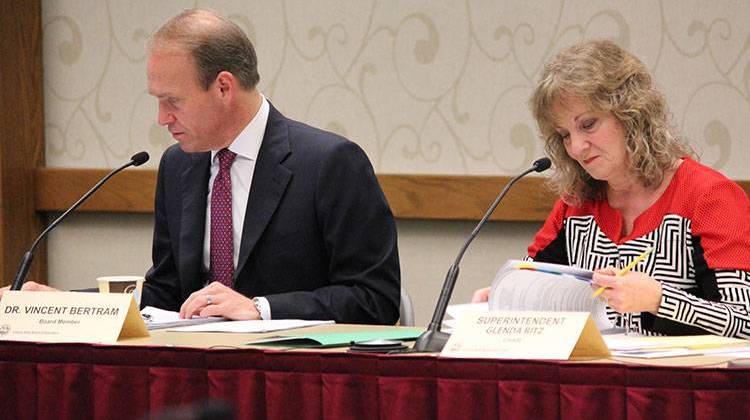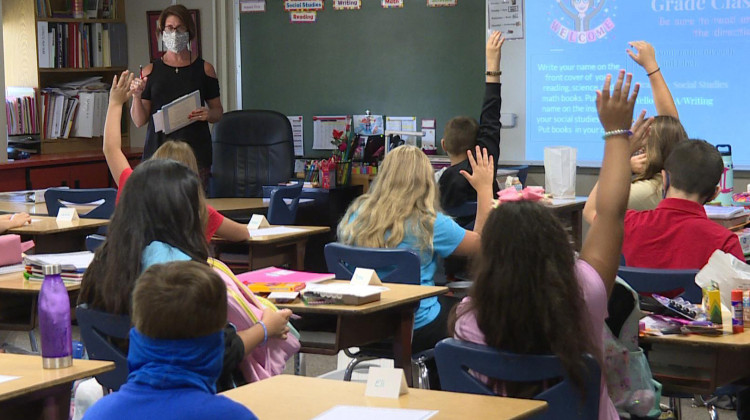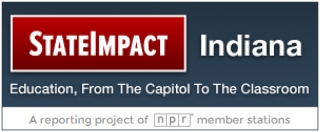
State Board of Education member Vince Bertram and state superintendent Glenda Ritz listen during the a meeting in June 2015.
Rachel Morello/StateImpact IndianaSummer may be in full swing, but school issues are still front and center following the conclusion of the Indiana legislature’s 2015 “education session.”
The State Board of Education gathers Wednesday in Indianapolis for its monthly meeting, with a long list of discussion items stemming from recently passed legislation. This is only the second time the group has convened with five new board members.
The newbies had a pretty light agenda for their first go-around – this time the to-do list looks a bit more substantive:
-
Board “elections:” As we explained last week, one of the provisions in the new law restructuring the board calls for members to appoint a vice chair and secretary. These people will work alongside the current chair, state superintendent Glenda Ritz, to facilitate board business. Many state education experts – and some board members – have their money on Avon schoolteacher Sarah O’Brien for the vice chair post, but in reality any of the 10 appointed members could end up in either position.
-
Accountability options: This one’s a doozy. Following a year that saw the rollout of entirely new academic standards and the first in a series of corresponding updated standardized tests, many Hoosier leaders expressed concern over how schools would be held accountable, given all the change. Luckily, the state has options. Last August, the U.S. Department of Education offered some states with waivers from the federal No Child Left Behind law – including Indiana – the option to delay incorporating student test scores into teacher evaluations until the end of the current school year. In response, a Senate committee asked the IDOE to create a list of options regarding how schools would receive A-F grades for the 2014-15 school year.
After consulting with a number of stakeholders, the department has come up with a list of 12 options. The IDOE is recommending option five from its list, “Hold Harmless,” which would assign each school the better A-F grade received between the 2013-14 and 2014-15 school years. This option is aligned to both state statutory requirements as well as USED flexibility standards, and would not require legislative action. Since the state board has final approval of all school grades, the group needs to approve whatever option the state decides to pursue.
-
Focus on dual language learning: The board will talk about a few dual language initiatives this month, thanks to new legislation passed this session. Senate Enrolled Act 267 tasks the board and the Department of Education with establishing both a state certificate of biliteracy and a dual language immersion pilot program. The board will initiate rule making to establish criteria for the certificate this month, and discuss the program outline and corresponding grant application crafted by IDOE staff. The department is encouraging interested public school district and charter school administrators to submit grant applications by Friday, July 24.
-
Remediation tests: The state’s new biennial budget includes appropriations ($12 million per year for the next two academic years) for the IDOE to distribute to districts for remediation testing. Legislators have earmarked the funds for schools to purchase tests to help identify students in need of remedial work. The state board must approve the grant funding formula, amounts and application period before the IDOE can open the window for schools to apply.
-
Testing windows: The group will approve a calendar for state standardized testing in the 2015-16 and 2016-17 school years. The slate of exams to be scheduled includes End of Course Assessments, IREAD-3, ACCUPLACER and ISTEP+. Remember, Indiana students will be taking a new version of the ISTEP+ this year, formulated and administered by the state’s new vendor partner, Pearson.
- High school diplomas: As we’ve explained, state education officials are discussing new options for the diploma options offered to Hoosier high school students. The board will receive an update on those ideas Wednesday from the Core 40 Subcommittee, a group with which Supt. Ritz has been heavily involved.
The board will also receive updates on new charter school grant and loan programs, as well as updated data sharing procedures to alleviate communication issues between their staff and the IDOE.
You can live-stream the meeting online beginning at 9:30 a.m. Wednesday morning.
 DONATE
DONATE






 View More Programs
View More Programs



 Support WFYI. We can't do it without you.
Support WFYI. We can't do it without you.